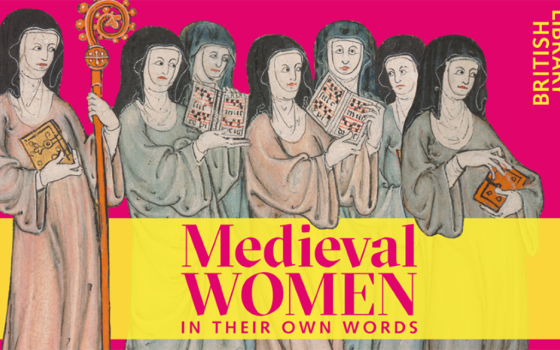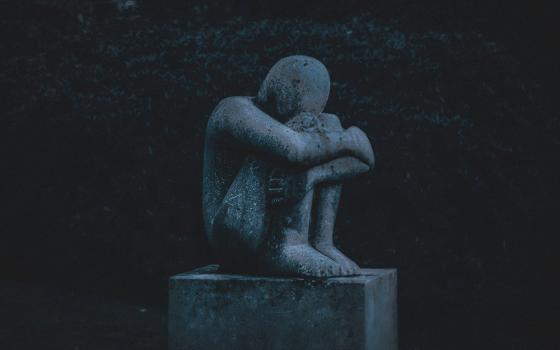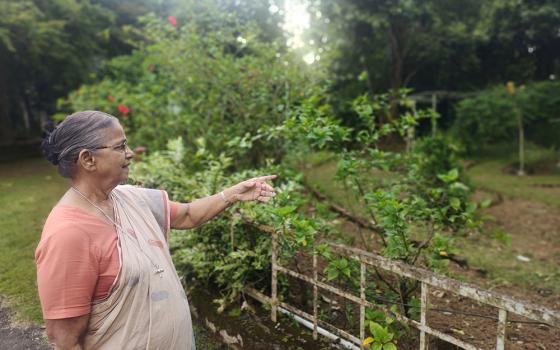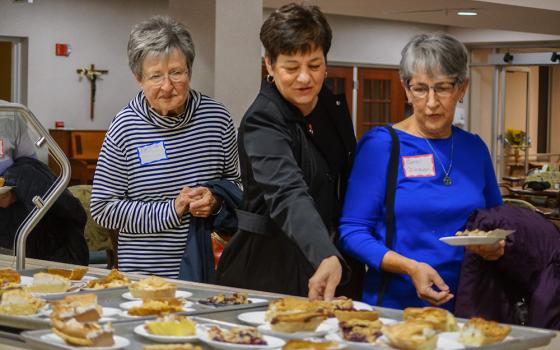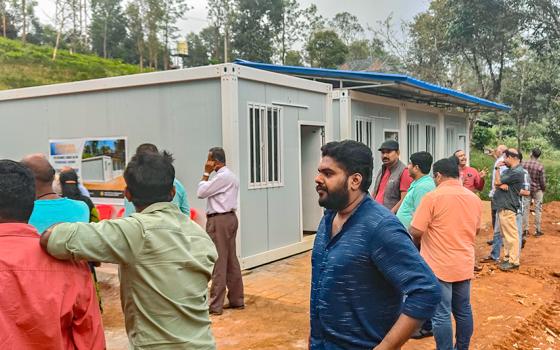
Sr. María de los Ángeles with resident Teresita Aquea from La Visitación de María nursing home, Fundación Las Rosas, in La Serena, Chile (Courtesy of Virginia Vargas)
Worldwide population aging brings, among other consequences, loneliness and an increase in the average age of homeless elderly people. Although not all of them require special care, the increase in this population today represents a challenge in terms of providing care. In this context, Chile represents one of the countries with one of the most accelerated rates of population aging in the Latin American region, according to data from the Economic Commission for Latin America and the Caribbean (CELAC). By 2050, the elderly population will represent 32% of the total.
On the other hand, in Chile, and to date, 43% of people who are homeless are over the age of 50. (Some of the most common causes for these scenarios are problems with family, death of loved ones, financial problems and health problems, especially mental health.)
"Every person has dignity from the moment we are born until we die, and part of caring for that dignity and respecting it is not being indifferent to the one who needs it," Sr. Virginia Vargas of the Servants of the Sacred Heart of Jesus and the Poor of Mexico, who works with older adults, told Global Sisters Report.
'Working with the elderly has served me well to live ... and to know that one is never self-sufficient. We always need help from others.'
—Sr. Virginia Vargas
Vargas has been living in La Serena for eight years, known as the fourth region in the north of Chile, where she lives together with four other sisters of the congregation in La Visitación de María nursing home.
"I think the elderly require it even more than children because a child, if left alone, may, for example, learn to walk; but an older adult sometimes needs a little more attention," the 30-year-old sister said. "As Pope Francis says, we must remove the idea that those who are useless because they do nothing are to be discarded, and remove this indifference toward older people, because they contribute to us on a cultural and social level, and we also learn from them when they share their experiences with us."
The nursing home opened 14 years ago and is part of 30 centers that Las Rosas Foundation has throughout the country, where about 90 adults over 60 years of age who lack resources or family members, or whose families have abandoned them, are housed.
Vargas, born in the city of Puebla, Mexico, cared for the older sisters of her congregation's central house in Mexico for two years before carrying out her service in Chile in 2015.
"Many mornings, when we pray with them, we remember this phrase from the congregation: 'The nursing home is the waiting room to heaven,' " Vargas said. "This is also true for us [those who work at the nursing home] because providing a service and doing it with love and affection in the way we would like to be treated is a way of giving back. By listening and caring for the grandparents, they also become our waiting room to heaven."
Advertisement
GSR: How do the elders arrive at La Visitación de María nursing home?
Vargas: Generally, these are people who live in poverty. Based on an agreement with Fonasa, the state agency refers adults who cannot be cared for in their own homes to the foundation, and according to their location, they are placed in the closest centers. We also usually receive people who are referred to us by public hospitals when, after receiving medical treatment, no family member claims them.
On the other hand, other adults decide to enter the home voluntarily, either due to a lack of resources or because their relatives decide to admit them because they have advanced dementia. Those grandparents who are "self-sufficient" and can handle themselves autonomously are usually placed in a special section and can leave their homes to go to the plaza or shop while in the care of companions.
What tasks do the sisters do at the home?
Our day begins at 8 a.m. when, together with the other sisters, we divide the hallways where we will work. Each home is divided by hallways: The first separation is between men and women; at the end of the building are self-employed people who can walk to their spaces; the center houses people in wheelchairs, but who can carry out activities autonomously, such as eating on their own; and finally, there are the bedridden, who are the ones who require the most attention.
We try to provide support at all meals since we are in charge of the kitchen, where we seek to make the most of all the resources we have. Although the foundation supports the centers with each grandparent's pension, several are homeless, so each nursing home must look for different forms of support, which leads us to ask for donations at vegetable markets and organize collections.
'Every person has dignity from the moment we are born until we die, and part of caring for that dignity and respecting it is not being indifferent to the one who needs it.'
—Sr. Virginia Vargas

Sr. Virginia Vargas with residents of Ventanas nursing home, fifth region of Chile, Valparaíso (Courtesy of Virginia Vargas)
What can you tell about your experience in this country and with older people?
A situation that has caught my attention since my arrival is the number of older adults and homes for them in Chile, a situation not seen in Mexico. Since I made my vows, I have enjoyed working with older adults because unlike children, with whom you can see how they grow, or with people with addiction problems, with whom you can see their recovery, that does not happen with the elderly as they are always in decline. That is why my motivation comes from a mission to win souls, to accompany them so that they can reach heaven.
On the other hand, the challenge we have when dealing with the elderly is learning to live day by day, or as we say: one step at a time. One cannot know how a resident, the staff or oneself will be on a given day. Grandparents can be very well one day, the next in the infirmary, and perhaps in the afternoon, they pass away.
In our mission as religious, the first goal is to do everything possible so that they know God and to be present when they need us most and administer the sacraments so they can receive the anointing of the sick or have their Mass once they die. We seek to get closer to them and help them know God and the home staff, who are the ones who have the most contact with them, so they receive good treatment.
The greatest poverty for a person is not having their family, and on many occasions, we become their family members because many of their people end up relegating them. It's hard to think that after giving their entire lives to their families, many end up abandoning them.
A communal gathering in the home where older sisters of the congregation of the Servants of the Sacred Heart of Jesus and the Poor are cared for. The house is called Quinta de las Rosas, in the city of Puebla, Mexico. (Courtesy of Virginia Vargas)
What skills did you have to develop to learn to work with them?
I learned to talk to them, which is very important, and not to treat them like children. The elderly are often infantilized, but they are people and were previously professionals or heads of families. You have to put yourself in their place and talk to them about their story so that they remember it because it gives them life and restores their spirits. It is also good to know that you are part of the history they continue to have.
I remember a sister that I took care of in Mexico who was very lonely and said that she didn't want to be with anyone because she had always been like that. I used to go every day and hug her, make a joke, or sing to her, and little by little, her mood changed. She died four years ago, at 102.
What reflection can you share about how working with older adults impacted your life?
From the grandparents, I learned a lot about humility: when they allow themselves to be helped, and when they have no choice but to trust. It takes true humility to let someone help to feed you, clean you or take you somewhere. Many people, because of their dementia, think they can still do things, but then they end up accepting help.
Working with the elderly has served me well to live and develop more humility and know that one is never self-sufficient. We always need help from others and must know how to ask for it: know how to ask for advice, and know how to listen because adults always want to be listened to.
I also learned not to complain so much. The sisters are the first to arrive at the chapel at five in the morning because they consider that if one neglects that, religious life will decline, and it is amazing how a 100-year-old sister asks us to get up at 4 a.m. to attend the prayer of the day.
What we seek when working with the elderly is to transform pain or resentment into redemption, into joy; that's why we organize parties and dances for them. These nursing homes are the waiting room for heaven.




